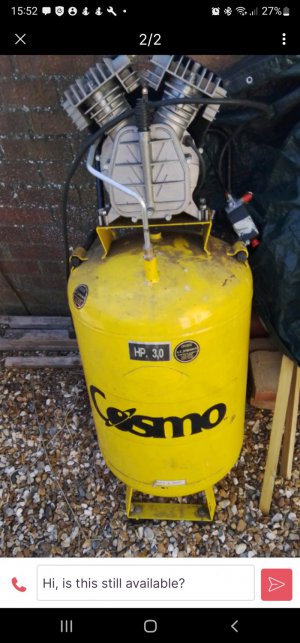Perhaps not a permanent fix, but I've been reading that a large amount of the noise from the compressor is the intake; so perhaps locating that to the outside will help reduce noise. It's got quite a large tank, so I'm hoping it won't run too much, but perhaps that's wishful thinking!My compressor is the first thing I turn when I go into the shop. And yes, isolate it and quiet it down as much as possible. I have my garage compressor on a sprung platform in the attic. This was done mostly to make room in the garage actual, but it also lessens noise inside the house.
And yes, it is OK to use air to clean off machines counter to what internet experts claim. I tend to use a small shop vac for the most part, but using it wisely as mentioned and wearing PPE are both essential. I generally tend to not blow things off in my basement shop as its too messy, but sometimes there is no better way.
The surface grinder is the one machine it is expressly verboten to use compressed air on.
I have one similar, a Royersford Excelsior and it is indispensable for a few limited tasks.
A power hacksaw will cut off metal more accurately and with less input than any other saw. Put your part in and set it up for the cut you want, walk away until the alarm (Cut off part hitting the floor) goes off. Their great for cutting off square or accurate angles where most other types of saws will leave a cut that needs refining before use.
I have the Royersford for the garage shop and a smaller Dunlap that is in the works for my basement shop.

Craftsman power hacksaw rebuild.
Trying to cut things to length in a small shop can be tricky. I have a small bandsaw, but cutting round stock can be problematic and the blade speed on these is generally too high to cut steel with anyway. I had a small Dunlop branded unit years back that was in pristine condition, but I sold...www.hobby-machinist.com
Hey look, I was helpful!
Im waiting for the weather to warm up so I can get back at that one.
Good to know about use of air in workshop, thank you!
I think in time I'll look to add a power hacksaw to the collection. Not something I'll need initially, but definitely sounds like they have their uses.
Very useful indeed! I used the manual to get the working measurements for the mill, but the manual will be indispensable once I get the machine in my workshop.


